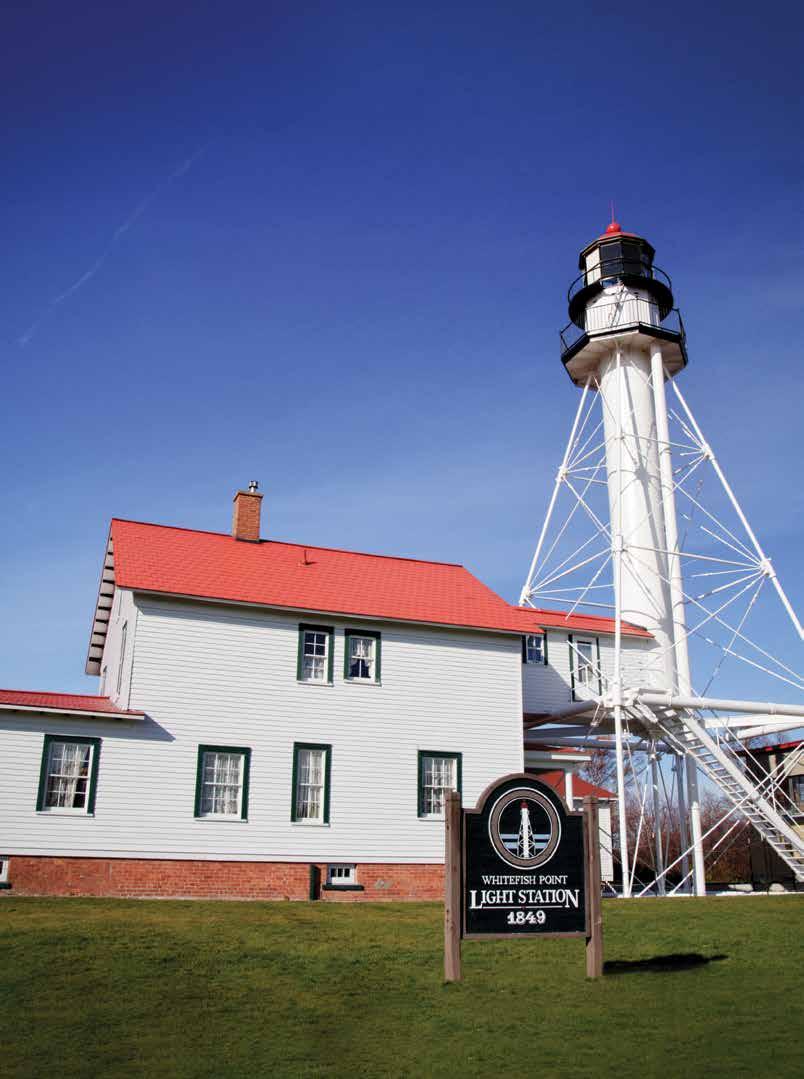

Not seeing is believing.
Almost every backyard has a shrine to cold air. It’s called an a/c unit. WaterFurnace will help you take back that space.

Air conditioners are unsightly and often located in the worst places. They’re vulnerable to the elements and can become home for small critters. But with geothermal, you won’t have an outside unit or any of these problems. So, reclaim your backyard. Plant some flowers and enjoy the unseen beauty that is WaterFurnace. Geothermal is the only renewable that provides reliable operation 24 hours a day, 7 days a week, 365 days a year.
YOUR LOCAL WATERFURNACE DEALERS
Allendale
Allendale Htg & Clg (800) 327-1937 allendaleheating.com
Bad Axe/Ubly
Cutting Edge Htg & Clg (989) 551-0986
Berrien Springs
Waterfurnace Michiana (269) 473-5667 gogreenmichgeo thermal.com
Big Rapids Stratz Htg & Clg, Inc. (231) 796-3717 stratzgeocomfort.com
Clifford Orton Refrig & Htg (989) 761-7691 sanduskygeothermal.com

Hart Adams Htg & Clg (231) 873-2665
adamsheating cooling.com
Indian River
M&M Plmb & Htg (231) 238-7201 mm-plumbing.com
Lansing Candor Mechanical (517) 920-0890 candormechanical.com
Lowell Arctic Inc. Htg. & Clg. (616) 897-4213 heatingcoolingonline.com
Mancelona Top Notch Htg, Clg, & Geothermal (231) 350-8052 Topnotchheatandair.com
Michigan Center Comfort 1/Air Serv of Southern Michigan (517) 764-1500 airserv.com/southernmichigan/
Mt Pleasant Walton Htg & Clg (989) 772-4822 waltonheating.com
Muskegon Adams Htg & Clg (231) 873-2665 adamsheatingcooling.co
Portland
ESI Htg & Clg (517) 647-6906 esiheating.com
Sunfield
Mark Woodman Plmb & Htg (517) 886-1138 mwphonline.com
Traverse City
D&W Mechanical (231) 941-1251 dwmechanical.com
Geofurnace Htg & Clg (231) 943-1000 geofurnace.com
CO-OP REBATE INCENTIVES
Cloverland: up to $4,200
Great Lakes: up to $3,000
Homeworks/Tri-County: up to $3,000
Presque Isle: up to $2,700
Cherryland: up to $2,500
Thumb Electric: up to $2,000
Alger Delta: up to $2,000
Michigan’s Electric Cooperatives
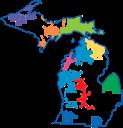
EXECUTIVE EDITOR: Casey Clark
EDITOR: Christine Dorr

GRAPHIC DESIGNER: Karreen Bird
RECIPE EDITOR: Christin McKamey
COPY EDITOR: Yvette Pecha
CONTRIBUTING EDITOR: Emily Haines Lloyd
PUBLISHER: Michigan Electric Cooperative Association
Michigan Country Lines, USPS-591-710, is published monthly, except August and December, with periodicals postage paid at Lansing, Mich., and additional offices. It is the official publication of the Michigan Electric Cooperative Association, 201 Townsend St., Suite 900, Lansing, MI 48933.
Subscriptions are authorized for members of Alger Delta, Cherryland, Great Lakes, HomeWorks Tri-County, Midwest Energy & Communications, Ontonagon, Presque Isle, and Thumb electric cooperatives by their boards of directors.
Postmaster: Send all UAA to CFS.
Association Officers: Tom Sobeck, Presque Isle Electric & Gas Co-op, chairman; Gabe Schneider, Cherryland Electric Cooperative, vice chairman; Chris O’Neill, HomeWorks TriCounty Cooperative, secretary-treasurer; Craig Borr, president and CEO.
CONTACT US/LETTERS TO EDITOR:
Michigan Country Lines
201 Townsend St., Suite 900 Lansing, MI 48933 248-534-7358 editor@countrylines.com

CHANGE OF ADDRESS: Please notify your electric cooperative. See page 4 for contact information.
The appearance of advertising does not constitute an endorsement of the products or services advertised.
6 AMERICA’S BEST CAMPGROUND IS RIGHT HERE IN MICHIGAN
After staying at 350-plus RV parks, Terrell and Katie Deppe applied their experience to develop the award-winning Indian River RV Resort.
10 MY CO-OP KITCHEN
One-Pan Meals: These delicious dinners make cleanup a breeze.
14 THE GREAT LAKES SHIPWRECK MUSEUM PRESERVES MICHIGAN’S RICH MARITIME HISTORY
The recently found wreck of the Nucleus adds to the museum’s many discoveries.
18 GUEST COLUMN

At One with Plants: Inheriting his grandmother’s love of horticulture, Gary Bopp made gardening his passion and his career.
#micoopcommunity Instagram contest winner Morning glow @chelseaolkowski (Chelsea Olkowski)
MI Co-op Community
To enter contests, submit reader content & more, visit countrylines.com/community
Instagram Contest
Use #micoopcommunity for a chance to be featured here and on our Instagram account.
Win $100 for photos published!
Recipe Contest
See details on page 10. Pumpkin recipes due Aug.1; Family Favorites due Sept. 1
Win a $100 bill credit!
Guest Column
Share your fondest memories and stories. Win $200 for stories published. Visit countrylines.com/ community to submit.
Win $200 for stories published!
Mystery Photo
See details on page 18. Win a $100 bill credit!
BOARD OF DIRECTORS
District 1—Big Bay
Darryl Small
906-345-9369 • smallwld14@gmail.com
District 2—Harvey/Deerton
Karen Alholm
906-249-1095 • karenalholm@gmail.com
District 3—Grand Marais
Mike Lawless
906-287-0007 • mclawless79@gmail.com
District 4—Cedar River/Palestine
Bill Wotruba 414-507-9787 • wotrubab@hotmail.com

District 5—Gourley/LaBranche/Cornell/Harris
Steve Wery
906-295-1255 • stevewery@deltacd.org
District 6—Nathan/White Rapids
Jesse Betters
715-923-4946 • jjbetters@gmail.com
District 7—Stonington/Rapid River
Kirk Bruno
906-399-1432 • kbruno.algerdelta@gmail.com
District 8—Nahma/Isabella
Don Johnson
906-280-0867 • dsj731@gmail.com
District 9—Hiawatha/Maple Ridge
Stephen Dausey
906-202-3899 • packer93@jamadots.com
GENERAL MANAGER:
Mike Furmanski
mfurmanski@algerdelta.com
HEADQUARTERS:
426 N. 9th St, Gladstone, MI 49837
906-428-4141 • 800-562-0950
Fax: 906-428-3840 • admin@algerdelta.com algerdelta.com
OFFICE HOURS
Monday–Thursday 7 a.m.–5 p.m. (EST)
Alger Delta Cooperative is an equal opportunity provider and employer.

Plan for a Safe and Happy Summer
By Mike Furmanski, General ManagerThe month of July has always been a favorite of mine. It’s the middle of summer, the kids are out of school, and of course, we celebrate Independence Day and have many summer activities! We remind you about a few important safety tips from the American Red Cross to ensure you have a safe summer.
The safest way to enjoy fireworks this summer is to head to a local fireworks show. But if you want to put on your show at home, be sure to follow these safety tips:
• Always follow the instructions on the fireworks’ packaging and never give fireworks to small children.
• Keep a supply of water close by as a precaution.
• Make sure to wear protective eyewear when lighting fireworks.
• Light only one firework at a time and never attempt to relight a “dud.”
• Store fireworks in a cool, dry place away from children and pets.
• Never throw or point a firework toward people, animals, vehicles, structures, or flammable materials.
Cookouts are popular during summer, too. Whether you are grilling in your backyard or at a community park, make sure your feast includes a generous portion of fun and a side helping of safety! We recommend the following safety tips:

• Always supervise your grill.
• Use the proper tools for cooking on a grill.
• Never add charcoal starter fluid when the coals have already been ignited.
• Always follow the manufacturer’s instructions when using grills.
Summer also means sunny days with high temperatures; be sure you are practicing sun safety:
• Use a broad-spectrum SPF sunscreen and reapply often.
• Protect your eyes by wearing sunglasses.
• Drink plenty of water.
• Watch for signs of heat stroke (hot, red skin; changes in consciousness; rapid, weak pulse; rapid, shallow breathing).
Alger Delta Cooperative wishes you a safe and happy summer!
Alger Delta Making a Difference in the Community
Bay Cliff Health Camp
In collaboration with CoBank and WPPI Energy, Alger Delta Electric recently made a $5,000 donation to the Bay Cliff Health Camp. Bay Cliff, located in Big Bay, Michigan, is a year-round, nonprofit therapy and wellness center for children and adults with disabilities. Bay Cliff’s flagship program is a seven-week, summer therapy camp session serving children with disabilities. The children work toward goals of increased independence and living a fuller life. Bay Cliff also provides a number of programs year-round, including an adult program for individuals with intellectual and developmental disabilities, an adaptive paddling workshop, and a number of weekend family camps.
Cooperative Family Fund
Mike Furmanski (left), general manager of Alger Delta Electric Cooperative Association, presents a $5,000 check to Tony Anderson (right), founder of the newly created Cooperative Family Fund. Alger Delta was able to donate to Anderson’s cause with the generous financial support of WPPI and by utilizing CoBank’s Sharing Success Program. The purpose of the Cooperative Family Fund is to provide support for children of electric cooperative employees when they experience the loss of a parent while actively employed at a cooperative. This support actively demonstrates the value our cooperative network places on cooperative families at the time of their greatest need. Visit www.cooperativefamilyfund.com to learn about this valuable program.
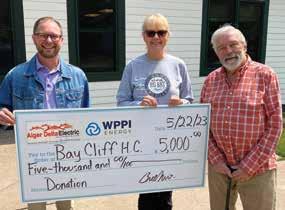

Alger Delta’s New Distribution Engineer
Alger Delta is pleased to welcome Jeanne Avendt as their new distribution engineer. Born in Houghton and raised in various parts of the U.P. and Wisconsin, Jeanne graduated from high school in Munising. She then attended Michigan Technological University, graduating in 2003 with a Bachelor of Science degree in electrical engineering with a power emphasis, and obtained her professional engineering license in 2007.

In her nearly 20-year engineering career, she has worked for several power-related companies in the Upper Midwest, including Cooper Power Systems, United Services Group/Great River Energy, and Connexus Energy. Prior to joining Alger Delta in March, she worked for UPPCO as their eastern district’s regional engineer.
Coming to work for Alger Delta was an easy decision for Jeanne. “I spent most of my career working with and at cooperative electric associations. I find the cooperative model of member ownership very appealing, and I also have always loved the culture at electric cooperatives. Most cooperatives are quite small with a large service territory. Team members wear a lot of hats and work together to accomplish what needs to be done,” she said.
She is excited to be on board at the co-op in this newly created staff position. “Having a staff engineer will allow Alger Delta to save money and improve the system,” she said. “I have a lot of experience from other companies, large and small, that I hope to use to make a difference to my team and our members.”
Jeanne resides in Marquette on a hobby farm with her husband and two girls, ages 4 and 7. The farm includes horses, dairy goats, pigs, and chickens. In her spare time, she enjoys hiking, camping, hunting, skiing, snowboarding, and fishing.
Please join us in welcoming Jeanne as the newest member of the Alger Delta Cooperative Electric Association team.
America’s Best Campground
Is Right Here In Michigan
By Emily Haines LloydOnce upon a time, in the middle of the woods, there was an RV park. It was neither too little nor too big. Neither too old nor too modern. Neither too remote nor too busy. It was, as our friend Goldilocks would say—just right. It was that “just rightness” that was likely the key to Indian River RV Resort being named Campspot’s 2023 Best Campground in America.
The story of any business, even one as charming as Indian River’s, is never a picture-perfect fairy tale. The owners of the RV park are Terrell and Katie
Deppe, who had no intention of buying an RV resort, or even an RV, until 2007. Terrell had taken a job in the tech industry, leading the couple to sell their home in Texas and move to Minnesota. The market had been good for home sales, but the couple was hesitant to pay the high prices the buyers’ market was asking. So, they rented, moving twice. During one of their transitions, Terrell, who was able to work remotely, was struck with an idea.
“I looked at Katie and said, ‘If we are going to have to keep moving, let’s just KEEP moving. Let’s buy an RV,’”
To learn more about Indian River RV Resort or to book a lot at the Best Campground in America, visit:
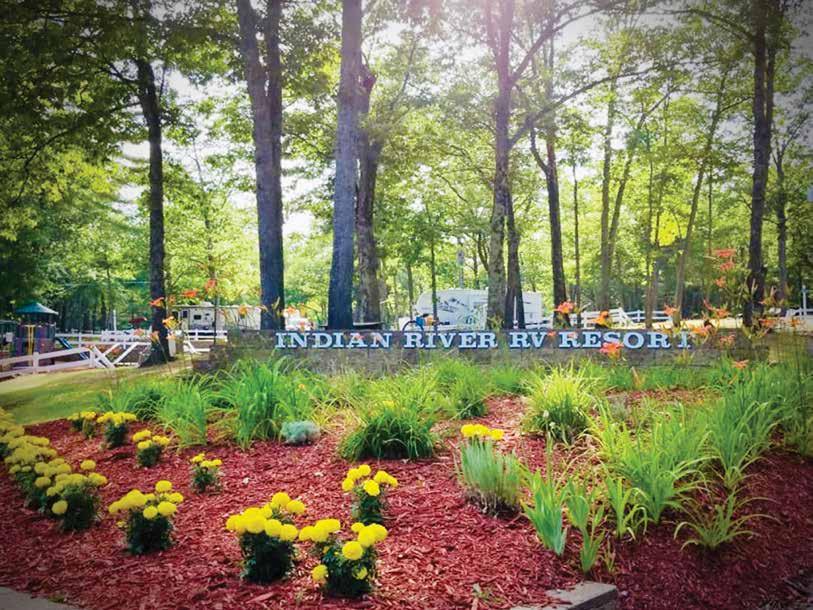
said Terrell. “It took her a while to wrap her head around the idea, but when she realized that the amount of money we were spending on rent and moving could pay for the depreciation of an RV in less than a year, she committed to 10 months.”
Ten months turned into five years during which the Deppes traveled to 46 of the lower 48 states in the U.S. and stayed in over 350 private, state, and national RV parks. They experienced the best and worst of them and were getting a feel for what worked and what didn’t in their nomadic lifestyle.
For the next decade, the Deppes began looking for an opportunity to take the knowledge they’d gained on the road and put that, along with their passion and grit, into an RV park of their own. That’s when Indian River RV Resort came into their lives. Finally, at the end of 2019, they had made an offer and were prepared to take on the challenges of owning an RV park— maybe not the sort of challenges they were about to face.

“I quit my job on Friday, March 13, and the country shut down on Monday,
March 16,” said Terrell, referencing the COVID-19 pandemic. “Had we just made the greatest mistake of our lives, or was God going to lead us to our promised land? We chose to act in faith.”
The Deppes went to the park to help the current owners open for the season—getting their hands into daily operations, waiting for the sale to close, and preparing for the July Fourth weekend.
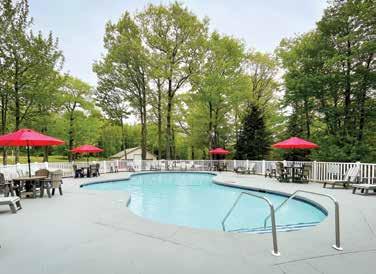

While much of the world had seemed to shut down, folks were still eager to travel with their families, and one of the few things open was the great outdoors.
“We were receiving an average of one call per minute, not counting the people standing in front of us to book future dates,” said Terrell. “We were using the resort’s previous paperbased reservation system. It felt like we were failing, and we had to make some big changes—fast.”
Luckily, Terrell’s experience in tech and the multitasking wizardry Katie had developed while home-schooling the couple’s four children were the
perfect skill set for the challenges they faced. They quickly switched to an online reservation system and were able to focus on creating a clean, quiet, family-friendly space similar to the ones they had enjoyed on their own RV travels.
Now the Deppes, along with their son Jonathan, turn their attention to maintaining the gorgeous land, keeping the facilities pristine and welcoming, and dreaming up ways to improve their guests’ experience. They often go above and beyond. One of their most recent projects was consulting with a certified master arborist about the well-being of their trees. With the findings, they swapped ground leaf removal for mulching and are already seeing healthier grounds. It’s this sort of attention to detail that allows their guests to let the busyness of the world fall away. It’s just the sort of thing you hope for when you head out to escape the dragons of the world and find yourself, for a time at least, living happily ever after.
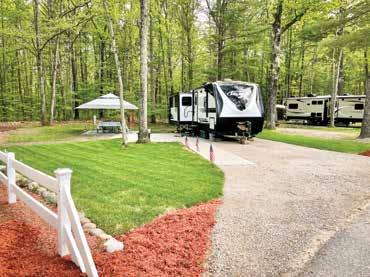
Summer Energy Savings
Help keep your cooling costs in check this summer with these tips from energy.gov.
5
Use Your Thermostat Wisely
• Try to keep your thermostat as close to the outdoor temperature as possible. The Department of Energy recommends at least 78 degrees when you are home. Turn up the thermostat even higher when you are away to prevent your A/C unit from running unnecessarily. A programmable or smart thermostat automatically adjusts the temperature to ensure you are cooling your home when you need to and not when you don’t.
2
Prevent Heat Gain From The Sun
• Sun shining in through windows and doors literally warms your home like an oven. Use window coverings to keep the sun out and your home’s temperature cooler.
1 3 4
Maintain Your A/C Unit
• For central air, have a professional check the unit annually. He or she will perform a proper tune-up and can spot some potential problems before they become emergencies.
• Change the filter on your HVAC unit regularly all year long.
Run Ceiling Fans
• Run ceiling fans at a fast speed in a counterclockwise direction to create a wind chill effect. Turn the fan off when you leave the room; fans cool people, not rooms.
• When first turning on the air conditioner, don’t turn the temperature way down to jumpstart the cooling effect. Your A/C unit doesn’t work faster because the temperature is lower, but it could cause it to run longer than necessary.

6
Be Smart About Appliances
• Only run full loads in your washer and dishwasher.
Seal Leaks
• Cracks and leaks around windows, doors, and utility cutouts allow warm air to enter the home and cause your A/C unit to work harder. Seal or caulk leaks and holes.
• Let your dishes air-dry instead of using the heat setting. Prop the door open once the final rinse is complete for faster drying.
• Cook or grill outside when you can to avoid running your stove or oven.
• Buy Energy Star-certified appliances; these appliances are guaranteed to run more efficiently than noncertified ones.
Camping
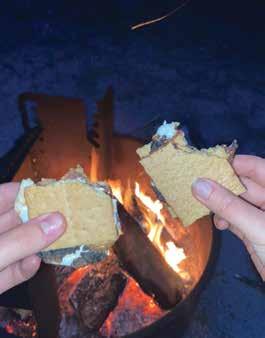
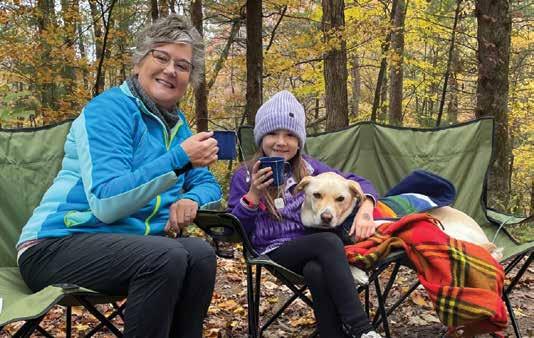
Submit a photo & win a $50 energy bill credit!
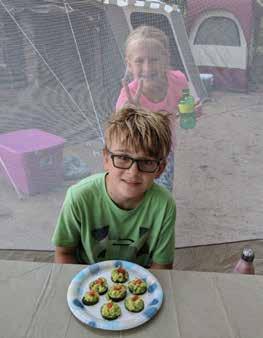
Submit Your Photos & Win A Bill Credit!
Alger Delta members whose photos we print in Michigan Country Lines during 2023 will be entered in a drawing. Four lucky members will win a $50 energy bill credit on their December 2023 bills!
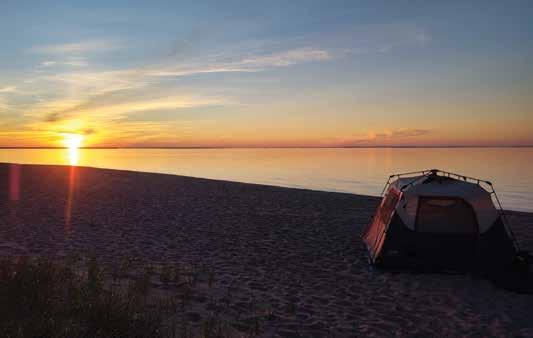
Upcoming Photo Topics And Deadlines: Porches, due July 20 (Sept./Oct.. issue)
Celebrations, due Sept. 20 (Nov./Dec. issue)
To submit photos, go to http://bit.ly/countrylines. We look forward to seeing your best photos!
ONE-PA N ME A LS
Win a $100 energy bill credit!
Pumpkin recipes due Aug.1; Family Favorites due Sept. 1

Submit your favorite recipe for a chance to win a $100 bill credit and have your recipe featured in Country Lines with a photo and a video. Submit your recipe at micoopkitchen.com , or send it via email (include your full name and co-op) to recipes@countrylines.com
WINNING
CREAMY BEEF TOMATO SKILLET
Jean Horrocks, Presque Isle Electric
1 pound ground beef
2 (15-ounce) cans diced tomatoes
1 (15-ounce) can tomato sauce
8 ounces (2 cups) uncooked elbow macaroni
½ cup chopped onion
1 medium green bell pepper, diced
1 tablespoon sugar
1 teaspoon chili powder (or to taste)
2 teaspoons salt
1 cup sour cream
• water, as needed
Brown meat in large skillet. Drain off all the fat as it collects. Stir in remaining ingredients, except sour cream. Add ¾ to 1 cup water and stir. Heat to boiling. Cover and simmer 20–25 minutes, stirring frequently. Add additional water if mixture is too thick. Cook just until noodles start to soften, then stir in sour cream; heat through but do not boil. Makes 6 servings.
Watch a video of this month’s winning recipe at micoopkitchen.com/recipe_ type/videos/
ONE POT PASTA E FAGIOLI

Shanasee Tersigni, Presque Isle Electric
1 teaspoon grapeseed oil
1 medium yellow onion, diced
4 cloves black or regular garlic
1 cup fennel, chopped (with fronds)
¼ –½ teaspoon pink Himalayan salt
¼ –½ teaspoon freshly ground black pepper
1 teaspoon Calabrian chili flakes or red chili flakes
1 sprig rosemary leaf
1 handful chopped fresh oregano
1 pound ground venison
2 zucchini, peeled and chopped
1 cup morel mushrooms
2 cups chopped kale
1 can (15-ounce) Italian stewed
tomatoes
2 cups organic chicken bone broth
2 cups low sodium V8
1 (8- ounce) box quinoa elbow
pasta, or favorite pasta noodles
1 (15.5- ounce) can cannelini
beans
1 (15.5- ounce) can dark red kidney beans
½ cup Peppadew peppers (a pickled piquant pepper) (substitute with sweet cherry peppers, sweet drop peppers, pimentos, sweet red peppers, or pepperoncini) & splash of pickling liquid from jar
• fresh basil and lemon zest, for garnishing
Heat ceramic cast iron pot to medium heat. Add oil. Sauté onions, garlic, fennel, salt, and pepper. Cook until onion and fennel are tender. Add herbs and ground venison. Cook until meat is browned. Add zucchini, morels, and kale. Sauté a minute, stirring. Add all remaining ingredients. Cook until pasta is al dente. Add additional broth or vegetable juice if needed. Garnish with fresh basil and lemon zest. Season to taste.
CHICKEN STIR FRY

Linda Heintz, Great Lakes Energy
2 tablespoons olive oil
1 pound uncooked chicken breast, cut into ¼-inch slices
1 small sweet onion, cut into chunks
1 small red onion, cut into chunks
8 ounces sliced mushrooms
1 cup small broccoli florets
1 cup small cauliflower florets
1 cup chicken broth
½ pound asparagus, sliced into 2-inch pieces
1 cup pea pods, strings removed
¼ cup soy sauce
2 tablespoons cornstarch
½ teaspoon salt
½ teaspoon sugar
• green onions, sliced
Heat oil in large wok over medium-high heat. Add sliced chicken and sauté until no longer pink. Add onions, mushrooms, broccoli, and cauliflower. Sauté until just beginning to get tender, 3 to 4 minutes. Add 1 cup of broth, put lid on pan and simmer for 2 minutes. Remove lid, then add asparagus and pea pods. Sauté until just beginning to soften and color turns bright. Mix together soy sauce, cornstarch, salt, and sugar. Add soy sauce mixture to pan and stir quickly. Continue to stir in all liquids and ingredients as sauce thickens. Can also sprinkle sliced green onions on top when finished. Serve alone or over rice. I use this same recipe with venison steak and use beef broth instead of chicken broth. You can use any vegetables you have on hand, but save the ones that cook quickly for the time period after the 2-minute simmer.
CHICKEN & GREEN OLIVES

4 bone-in skinless chicken breasts, quartered
• salt & pepper
½ cup flour
2 cups extra virgin olive oil
1 large onion, diced
4 cloves garlic, minced
2 cups white wine
1 (5- ounce) jar Spanish green olives, sliced with pimento
1 teaspoon cinnamon
Salt and pepper chicken breasts and then dredge in flour. Heat olive oil in skillet and fry chicken until crisp
on both sides but not fully cooked. Remove chicken from skillet and pour out all but a ¼ cup of the olive oil. Turn temperature to medium. Add onions and cook for about 3 minutes until translucent. Add garlic and cook for about 1 minute, turning. Add white wine and let cook down until reduced by half. Add olives and roughly 4 tablespoons of juice from the jar. Add the cinnamon and stir. Add the chicken and put a lid on. Simmer for 30 minutes. Best if served over longgrain rice.
COWBOY STEW
Lynn Hagon, Great Lakes Energy
1 pound hamburger
1 (15-ounce) can vegetable soup

1 (15-ounce) can tomato soup
2 cups water
3–4 carrots, cut up
2 medium potatoes, cut up
1 small onion, chopped
Brown hamburger and onion; drain. Add soups, water, and vegetables. Cook for about 45 minutes or so.
Kim SchumacherCommunity Dynamo
By Yvonne WhitmanPowell Township is a small community located 30 miles north of Marquette. Steeped in history that ties it to early settlers and Henry Ford, it is situated in one of the most picturesque locations in Michigan. Nestled on 45 miles of pristine Lake Superior shoreline, the area has much to offer, and so does one of its residents. Community dynamo Darlene Turner has resided here since 1977 when she and her husband pulled up their roots, left the Lower Peninsula, and purchased the Picture Bay Motel in rural Big Bay. “My dad started hunting here in 1936 and fell in love with the area. He then started bringing all of us kids up here for a week every summer. Then he retired up here. Six of my seven siblings followed suit, and we all moved here,” she said. Quite an endorsement for what the area offers.
Once settled, Darlene dove right into things. “I knew I had to get involved in community things. We had two children enrolled in the school, and it just snowballed from there,” she said. That may be an understatement. For the past 30 years, she has been serving Powell Township in various capacities, both as an elected official and as a volunteer. She has been the Powell Township supervisor for the last 11 years. Prior to that, she was a trustee for eight years, and before that, she served as a member of the Parks and Recreation Committee. And along the way, Darlene also got involved in any local club’s fundraising endeavors that
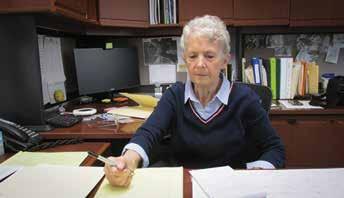
benefited the community. Whether helping to make entire turkey dinners for crews working on the snowmobile trails or just pitching in with manual labor on a project, she showed up.
Darlene, an avid nature enthusiast, was also instrumental in the process of receiving a DNR grant for Thomas Rock, a renowned lookout point. She then went on to get a 400acre land acquisition grant in the same area, which resulted in the building of hiking and biking trails. After this, she applied for and received two Michigan Department of Agriculture & Rural Development grants for building the trails. “I’m just so happy that some of these places are
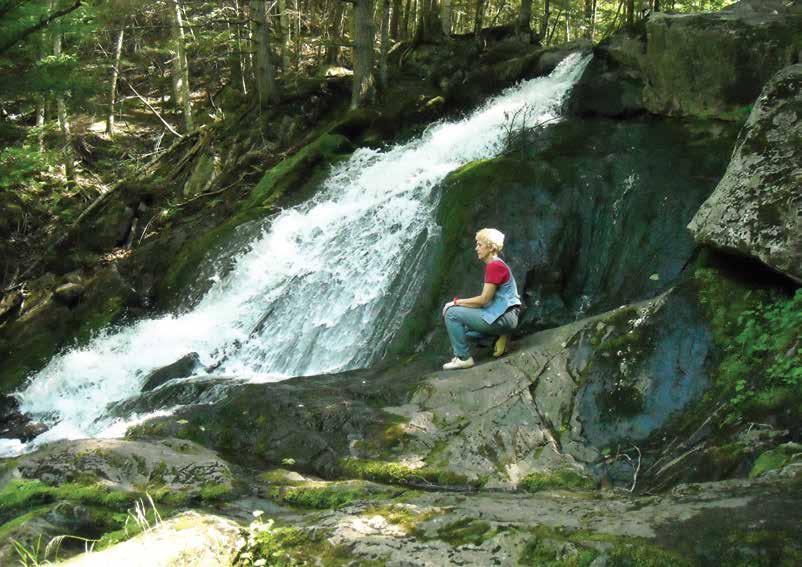
getting developed in an environmentally conscious way that benefits the community,” she said.
For many years, visitors arriving in Big Bay had nowhere to turn to for general tourism information on the area. That changed when Darlene and two friends opened the North Shore Treasures gift shop, which also functioned as an information center for tourists. Offering small treasures and serving up insider info on where to go and what to do, Darlene and her friends successfully ran the seasonal business for 24 years.
When asked what she is most proud of, she immediately responds with, “Saving the homestead.” The homestead, also known as “Burns Landing,” is a historic site in Big Bay. In the 1800s, it was where the Native American Indians would spend their summers, picking berries and fishing on the shores of Lake Superior. It was first settled in the 1860s by a French-Canadian trapper named Maurice LeClair. He married a local Native American woman and built a beautiful two-story, square, timber log cabin that later was occupied by a man named Charles Burns. The site also functioned as the main hub in the community as this was where boats carrying supplies for logging camps would dock. Over the years, the historic cabin fell into disrepair. “Repairing it had been on the docket for years, but there just was no money in the budget to do it,” Darlene said. “We got to work and initially received funding from Eagle Mine and local donations, and we were able to restore it and preserve it and its history for generations to come.” The site is also a popular local swimming spot, so Darlene then wrote a Michigan DNR Recreation Passport grant to upgrade the parking lot and build a boardwalk. A second grant will allow the community to build an accessible ramp as well as additional bathroom facilities.

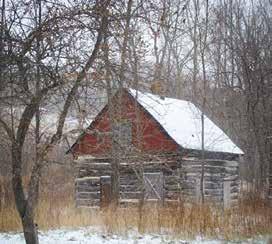
Darlene is quick to mention that while she may have spearheaded many of these projects, they did not come to fruition without the help of the proverbial village. “It wasn’t just me. There were multiple people helping all along the

way. So many people in the community stepped up,” she said. And along the way, there were some naysayers, but she was never deterred. “Some people would say that bringing these large projects to fruition wasn’t feasible. But I didn’t let that stop me. My parents taught me to work hard and be proud of what you do,” she said.
Longtime Big Bay resident and Alger Delta board member Darryl Small has high praise for Turner. For the 35+ years that I have known her, Darlene has been quietly involved in many aspects and activities in this community. Her roles have included being a successful business owner, township supervisor, an advocate for tourism and preservation, and a dedicated volunteer with numerous community events. Her involvement is always for the betterment and enjoyment of this area, not for any personal recognition,” he said.
Now 78, Darlene says she will retire when she hits 80. “These young people are so sharp. I like to think I did well for the township, but I think if someone young took over, they could also do well for the township.” Never one to stay still for long, she added, “I will continue to be involved in the community in other ways.” And the Powell Township community is all the better for it.
“This country will not be a good place for any of us to live in unless we make it a good place for all of us to live in.” — Theodore Roosevelt
“In a musty old hall in Detroit, they prayed In the maritime sailorsʼ cathedral
The church bell chimed ʻtil it rang twenty-nine times For each man on the Edmund Fitzgerald.”
THE GREAT LAKES SHIPWRECK MUSEUM
PRESERVES MICHIGAN’S RICH MARITIME HISTORY
 By Emily Haines Lloyd
By Emily Haines Lloyd
The recent discovery of the wreck of the Nucleus is just one of many stories brought to light by the museum.
The Gordon Lightfoot song made the Edmund Fitzgerald, a freight ship lost in Lake Superior in 1975, the most famous shipwreck in a century. However, the depths of the Great Lakes are the secret keepers and silent graves of thousands of ships lost in its waters. Among them is the recently discovered Nucleus, a 144-foot Barquentine found under 600 feet of water around 40 miles northwest of
Vermilion Point on Lake Superior. The Nucleus was lost at sea over 150 years ago in 1869.
“It can be hard for folks to understand how a ship could go missing for so long without being discovered,” said content & communications director for the Great Lakes Shipwreck Historical Society (GLSHS), Corey Adkins. “But these ships went down before radar, before GPS. So, how is it documented when a ship goes down back then?”
Lucky for historians and maritime aficionados, the technology has grown exponentially, and the efforts of groups like GLSHS discover more missing vessels each year.

GLSHS fi rst discovered the wreckage of Nucleus using a Marine Sonic Technology side-scan sonar in the summer of 2021, and positively identifi ed the wreck in 2022 using the organization’s ROV (remotely operated vehicle). The wreck was in surprisingly good condition, which helped with the next phase of the discovery. Much like any investigation, the next steps included a great deal of research.
“There was no name visible, but the wreckage was a perfect size and in the perfect place to deduce it was Nucleus,” said Adkins. “From there, you piece together a story using old news articles and documents. Little by little, the story becomes clearer.”
Part of Nucleus ’ story includes a history of nine or 10 accidents at sea and the fact that it had sunk two other times—which earned it the
moniker of “Bad Luck Barquentine.” Additionally, on the Nucleus ’ fi nal and fateful voyage, another ship, the Union, had come upon the sinking vessel, slowed down, and eventually steamed on without any sort of communication or effort to rescue the crew.

“That is just not done,” said Adkins. “There is an unwritten law of the sea, that you always help another ship in distress. The fact that the Union didn’t assist just adds to the mystery of this wreck. But still, amazingly, there was not a single life lost.”
Mystery solving is at the heart of GLSHS’ mission. They are actively looking for wrecks every summer into early fall, hoping to piece together more stories of both the ships and those who sailed on them. The Great Lakes Shipwreck Museum, operated by GLSHS and located at the Whitefish

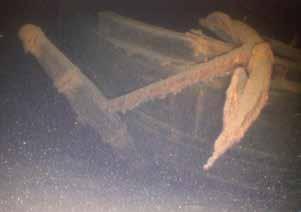
Point Light Station, offers more stories for visitors to discover and an opportunity to walk the beach afterward to reflect on the area’s rich history.
“We are proud to share the history and tell the stories of these discoveries,” said Adkins. “Every story is important to us. All the lives and the losses. Most people only know about the Edmund Fitzgerald . But that is not the only story.”
FOR MORE INFORMATION:
Top: An anchor from the Nucleus.Know What’s Below Steps for Safe Digging
Perhaps you’re making plans for a new garden or a lawn makeover. However, if you’re planning to revamp your backyard oasis, remember to keep safety in mind for all projects—especially those that require digging near underground utility lines.
Most of us never think about the electric, gas, water, and other utility lines buried below the ground, but hitting one of these lines while digging is not the reminder you’ll want—trust us! Alger Delta reminds all members who are planning a digging project to call 811 three to five business days before you start. Or you can submit a request online by visiting www.call811.com/811-In-Your-State. Here’s how the process works:
After you call 811 or submit your request online, all affected utilities will be notified of your intent to dig. It may take the utilities a few days to get to your request, so please be patient. The affected utilities will send someone out to mark the buried lines with paint or flags. Before you break ground, confirm that all the utilities have responded to your request. If you placed your request by phone, use the process your 811 call center representative explained. If you submitted your request online, refer to your 811 center ticket to confirm everything.
By taking this important step before you break ground on your project, you can help protect not only yourself but our community. Disrupting an underground utility line can interrupt service, cause injuries, and cost money to repair, so remember to call 811 first and know what’s below.
FIVE STEPS FOR SAFE DIGGING
Working on an outdoor project? Careless digging poses a threat to people, pipelines, and underground facilities. Always call 8-1-1 first. Here are five easy steps for safe digging:
1.NOTIFY
Call 8-1-1 or make a request online three to five days before your work begins. The operator will notify the utilities affected by your project.
2.WAIT
Wait two to three days for affected utilities to respond to your request. They will send a locator to mark any underground utility lines.
3. CONFIRM
Confirm that all affected utilities have responded to your request by comparing the marks to the list of utilities the 8-1-1 call center notified.
4. RESPECT
2-3
Respect the markers provided by the affected utilities. The markers are your guide for the duration of your project.
5. DIG CAREFULLY
If you can’t avoid digging near the markers (within 18-24 inches on all sides, depending on state laws), consider moving your project location.
Source: call811.com
Should I Change My Charging Habits?
Four things to know about extending rechargeable battery life

Many of us are so connected to our phones, tablets, and laptops that we panic when their battery nears the dreaded 0% mark. We want our device batteries to perform well for as long as possible. If you ever fret over your device’s power levels, here are tips on striking the right balance between battery health and how you work and play.
Keep your battery about 40% to 80% charged.
There’s a lot of reasonable advice around the internet to keep your phone charged between 20% and 80%, or between 40% and 80%. To understand those recommendations—and why you might want to either follow them or ignore them—it helps to understand how rechargeable batteries work.
Up until about 20 years ago, batteries benefitted from occasional “deep discharges”—running the battery down until the device shuts off. But because of the different materials used in batteries today, that’s not true anymore.
Rechargeable batteries contain two different materials that produce electricity when particles flow from one to the other. They flow in the other direction when being recharged. That process will degrade any battery over time. Keeping both sides of the battery in balance, with the device charged at about 50%, will put the least amount of stress on the battery and make it last longer.
But that’s unrealistic—no one’s going to keep their phone half-charged all the time. So, the experts try to make it easier by recommending 40% to 80% or 20% to 80%. Apple devices offer even more flexibility, pointing out that modern rechargeable batteries are designed to last for years in the various ways you use them. They recommend that rather than worrying about the battery, you just focus on using and enjoying your device.
Overnight charging can add stress to some batteries.
Charging your device up to 100% or letting it drain to 0% until it shuts down does put extra stress on the battery and can shorten its life. That’s why it can make sense to charge your devices occasionally throughout the day rather than keeping them plugged in while you sleep. Newer electronics will actually stop charging at 100%. But then, each time the charge drops to 99%, charging will resume.
Keep it cool, but not cold.
One absolute in battery care is don’t let your device get warmer than 95 degrees. Keep it out of the sun, and never leave it in a hot vehicle. If the device does get hot, don’t go to the other extreme and put it in the freezer. Just place it in the shade or take the cover off for a while.
Use less power.
It sounds simple, but one of the easiest ways to put less stress on the battery is to use less power. You can close energy-draining apps and functions when you’re not using them, and you can activate energy-saving settings like putting the device to sleep sooner. Another easy way to reduce battery use is to activate the “airplane mode” button every now and then.
If you’re the kind of person who likes to turn in their electronics every couple of years for the latest versions, these recommendations likely won’t apply. But if you’re someone who wants your devices to last longer, these suggestions can help prolong battery life.
At One with Plants
By Rik Cryderman, a Presque Isle Electric & Gas Co-op member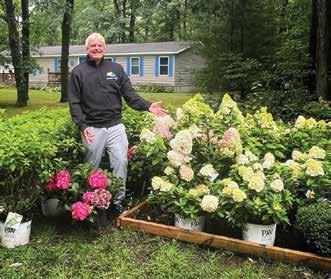
S
he was seldom seen without an apron and seldom seen not working. She was a farmer. Forever. And even when she didn’t live near fields and barns, she was a farmer still, in her heart. She mentored many and inspired far more. A little grandson followed her, closer than her shadow. He learned her love of plants and gardens—it was far more caught than taught. He’d quote her homespun adages, like scriptures learned in church. Some were rather humorous, like when he’d say, with serious tone: “My grandma says she knows she’ll never go to hell, because the devil knows she builds a better fire,” or “I don’t need to rest, I can sleep when I’m dead!” As this grandson grew in stature, he still loved the things she loved. With spades and trowels as his artist’s tools, he created lovely gardens. He learned the proper names of every plant he planted—good friends should have good names. He’d learned from his aproned grandma which plants chose sunny spots and which preferred the shade. He knew when each would be awake and bring their brightest flowers, so he’d plant his gardens in such a way that some would always be in bloom.
This grandma’s boy went off to school, to Michigan State one day. And there he chose to study plants and gardens and propagation. He’d learn his grandma’s favorites had Latin names as well. He’d graduate with honors, assisting his professors. He’d later maintain gardens at the Edsel Ford estate and land a job he’d hold for years, growing perennials for Wiegand’s Nursery. His grandmother moved to heaven—she tends the gardens there. But Gary Bopp, without an apron, continues her gardening here. Retired, he now spends his summers in Lewiston, a rare jewel in northern Michigan. He lives in a place called Bliss Cottage, surrounded by Bliss Gardens. He still propagates perennials, knows each by name, knows each one’s game. He sells them each Saturday morning at Lewiston’s Farmers’ Market. He’s become a local consultant, inspiring the love of the garden. He loves to know his green “children” find
good homes with his neighbors and friends. He likes to imagine he might be a part of making this world more beautiful—spreading awe and fueling wonder in gardens. Last year he propagated 5,000 perennials, tough tested by Lewiston’s climate. He watches with pride as they’re carried from the market to gardens nearby. And somewhere in heaven, an angel with an apron worn over her robe looks down and tells those around her, “I taught him all that he knows.”
“When some people leave this world,” Gary reflects, “they leave a grand monument, a vast estate, or a collection of tributes, awards, and accolades. I hope to leave a garden.”
About the author: Rik Cryderman is happily retired after a 35-year career as director of pastoral care for Beaumont Hospital in Troy, Michigan. He splits his time between Lewiston, Michigan, and Naples, Florida, enjoying grandchildren, gardening, travel, photography, and writing. Fueled by his faith and inspired by his friends, he finds each of life’s chapters better than the last.
Guest Column
Win $200 for stories published!
Share your fondest memories and stories. Win $200 for stories published. Visit countrylines.com/community to submit.
Mystery Photo

Win a $100 energy bill credit!

Where In Michigan Is This?
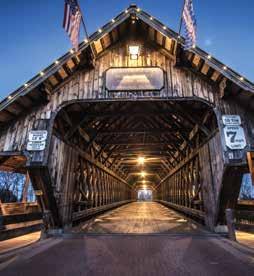
Identify the correct location of the photo to the left by July 24 and be entered into a drawing to win a $100 electric bill credit. Enter your guess at countrylines.com/community









May 2023 Winner! Our Mystery Photo winner is Michelle Cockey, a Midwest Energy & Communications Cooperative member, who correctly identified the photo as the memorial plaque of Ryerson and Melissa Whiting at Whiting Park in Charlevoix County. Winners are announced in the following issues of Country Lines: January, March, May, July/August, September, and November/December.














HOW TO PREVENT ELECTRIC SHOCK DROWNING
Each year, 3,800 people in the U.S. die from drowning. Electric shock drowning occurs when an electric current escapes boats, docks, and lights near marinas, shocking nearby swimmers. There are no visible signs of current seeping into water, which makes this a hidden danger. The electric shock paralyzes swimmers, making them unable to swim to safety.
ELECTRICAL SAFETY TIPS FOR:

Swimmers
• Never swim near a boat or launching ramp. Residual current could flow into the water from the boat or the marina’s wiring, potentially putting anyone in the water at risk of electric shock.
• If you feel any tingling sensations while in the water, tell someone and swim back in the direction from which you came. Immediately report it to the dock or marina owner.
Boat Owners
• Ensure your boat is properly maintained and consider having it inspected annually. GFCIs and ELCIs should be tested monthly. Conduct leakage testing to determine if electrical current is escaping the vessel.
• Use portable GFCIs or shore power cords (including “Y” adapters) that are “UL- Marine Listed” when using electricity near water.
• Regularly have your boat’s electrical system inspected by a certified marine electrician. Ensure it meets your local and state NEC, NFPA, and ABYC safety codes.
DO NOT enter the water. You could become a victim, too.
